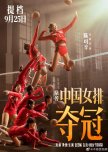For love of the game
Leap is a sports-themed movie chronicling the development of China’s ladies’ volleyball team, from its humble beginnings in the 1980s to its current status as one of the powerhouses in the international women’s game today. It is based on actual events and also serves as a biography for the legendary Lang Ping, a former member of the original 1980’s team of rising stars who is now the head coach of the Chinese women’s team. The story spans nearly 40 years and unfolds from the perspective of Lang Ping.
With a lengthy running time of 2 hours 15 minutes, watching the movie did not feel long at all. On the contrary, it felt shorter than it actually is and progresses at quite an engaging pace. When the storytelling is deeply compelling and evokes much excitement, as do most sports-themed shows that re-enact thrilling moments of competitive events, time passes you by without you even knowing. 4 pivotal events were incorporated into the story, notably the friendly/ practice match between the women’s team and the Jiangsu men’s team in 1980, the World Cup finals in 1981 between China and Japan, the Beijing Olympic group game in 2008 between China and USA, and finally the Rio Olympics quarterfinals in 2016 between China and the hosts Brazil. Watching these events felt like watching the real thing, with edge-of-the-seat thrills and whirlwind of emotions as the games were played out. It certainly helps with the suspense when I wasn’t aware of the actual results.
In between the games, we get to see Lang Ping’s personal journey, portrayed by Bai Lang (Lang Ping’s real-life daughter) in her youth and the ever magnificent Gong Li in her later years, through the struggles she experienced in making the women’s team, her stint as the head coach for the USA women’s team, and finally taking over the coaching for the Chinese team during a transitional period of reforming the entire volleyball set up. Both actresses did a marvelous job of depicting the real life icon to viewers who may not have been aware of the emotional challenges she had faced during all the years that she was involved in the sport.
In addition, the supporting cast did a remarkable job as well - Huang Bo and Wu Gang, who played the affable Cheng Zhong He (Pang Ling’s friend and colleague) and the strict-as-hell Yuan Wei Min (Pang Ling’s first coach in the 1980s) respectively. The friendship between Lang Ping and Zhong He, in particular, was beautifully brought to life in the most naturally-portrayed manner. It’s worth mentioning that real life volleyball stars were cast as themselves for the final event, the 2016 game, as were the Brazilian players. All this adds to the sense of realism in the re-enactment of the sporting moments in the film.
The meaningfully written ending theme, River of Life 生命之河, performed by Faye Wong 王菲 and Na Ying 那英, accompanies a montage of actual competition footage in the closing credits.
This well crafted, beautifully presented and well acted production is the recipient of 8 nominations for various categories of the 2020 Golden Rooster Awards, of which it won 3 awards, namely for best picture, writing and cinematographer. And it isn’t hard to see why - the nominations and awards are truly well deserved for what has been an incredible depiction of the dramatic and eventful evolution of China’s ladies’ volleyball team over the last 4 decades.
With a lengthy running time of 2 hours 15 minutes, watching the movie did not feel long at all. On the contrary, it felt shorter than it actually is and progresses at quite an engaging pace. When the storytelling is deeply compelling and evokes much excitement, as do most sports-themed shows that re-enact thrilling moments of competitive events, time passes you by without you even knowing. 4 pivotal events were incorporated into the story, notably the friendly/ practice match between the women’s team and the Jiangsu men’s team in 1980, the World Cup finals in 1981 between China and Japan, the Beijing Olympic group game in 2008 between China and USA, and finally the Rio Olympics quarterfinals in 2016 between China and the hosts Brazil. Watching these events felt like watching the real thing, with edge-of-the-seat thrills and whirlwind of emotions as the games were played out. It certainly helps with the suspense when I wasn’t aware of the actual results.
In between the games, we get to see Lang Ping’s personal journey, portrayed by Bai Lang (Lang Ping’s real-life daughter) in her youth and the ever magnificent Gong Li in her later years, through the struggles she experienced in making the women’s team, her stint as the head coach for the USA women’s team, and finally taking over the coaching for the Chinese team during a transitional period of reforming the entire volleyball set up. Both actresses did a marvelous job of depicting the real life icon to viewers who may not have been aware of the emotional challenges she had faced during all the years that she was involved in the sport.
In addition, the supporting cast did a remarkable job as well - Huang Bo and Wu Gang, who played the affable Cheng Zhong He (Pang Ling’s friend and colleague) and the strict-as-hell Yuan Wei Min (Pang Ling’s first coach in the 1980s) respectively. The friendship between Lang Ping and Zhong He, in particular, was beautifully brought to life in the most naturally-portrayed manner. It’s worth mentioning that real life volleyball stars were cast as themselves for the final event, the 2016 game, as were the Brazilian players. All this adds to the sense of realism in the re-enactment of the sporting moments in the film.
The meaningfully written ending theme, River of Life 生命之河, performed by Faye Wong 王菲 and Na Ying 那英, accompanies a montage of actual competition footage in the closing credits.
This well crafted, beautifully presented and well acted production is the recipient of 8 nominations for various categories of the 2020 Golden Rooster Awards, of which it won 3 awards, namely for best picture, writing and cinematographer. And it isn’t hard to see why - the nominations and awards are truly well deserved for what has been an incredible depiction of the dramatic and eventful evolution of China’s ladies’ volleyball team over the last 4 decades.
Was this review helpful to you?


 21
21 35
35 7
7



















